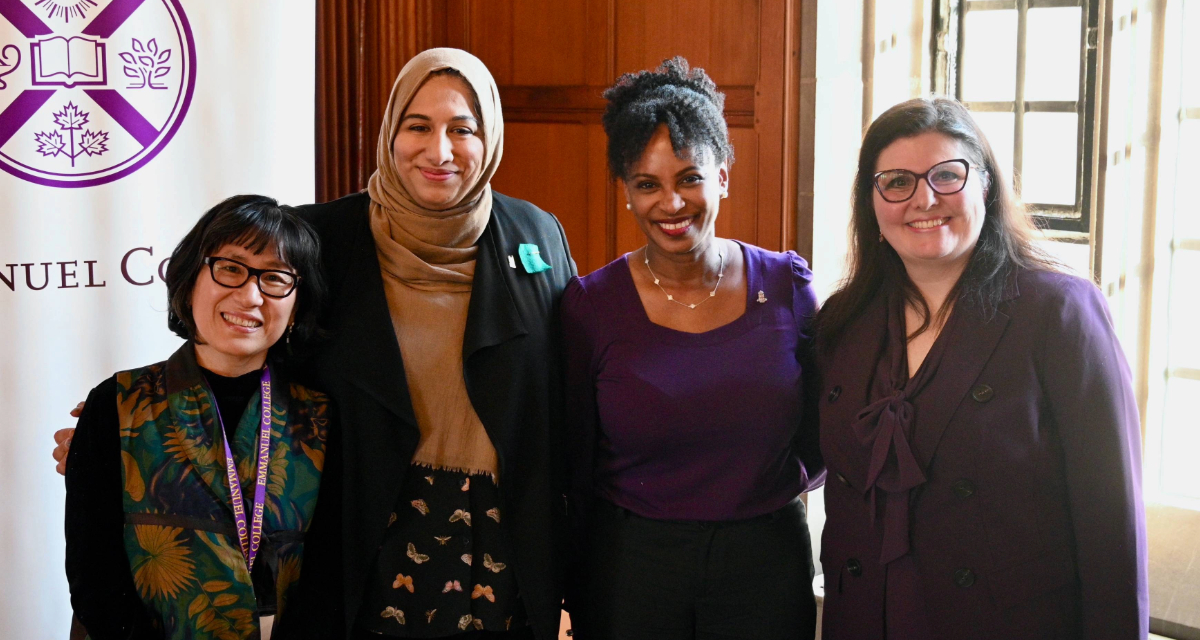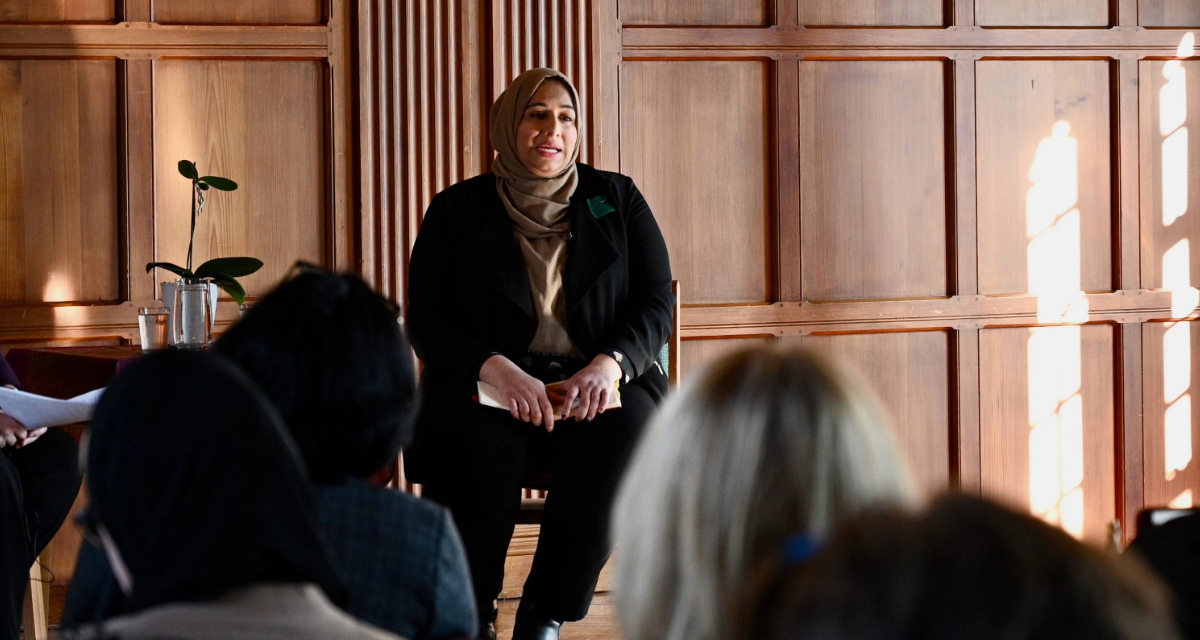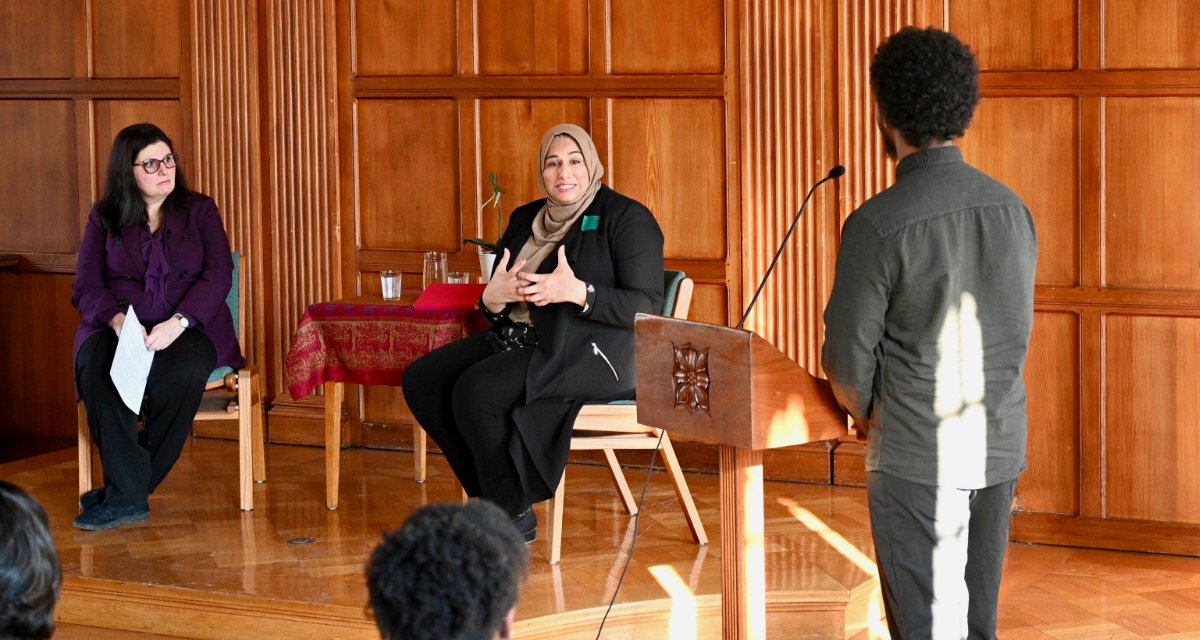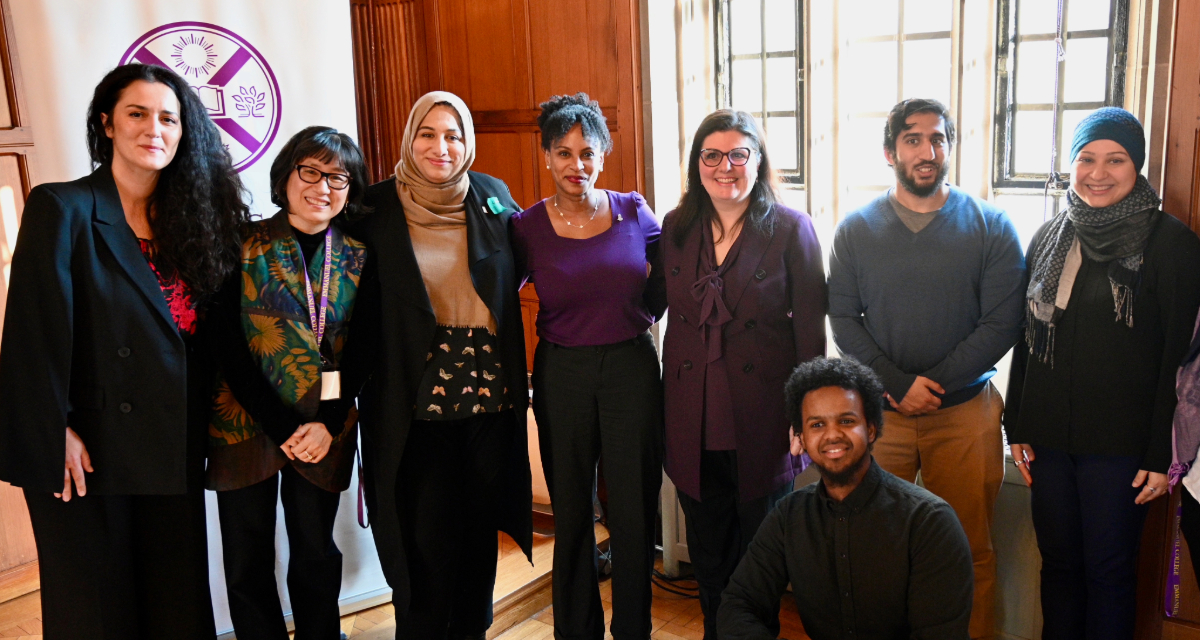Deputy Mayor Visits Emmanuel to Commemorate Quebec City Mosque Attack

HyeRan Kim-Cragg, principal of Emmanuel College; Councillor Ausma Malik, deputy mayor of Toronto; Rhonda McEwen, president of Victoria University; and Nevin Reda, associate professor of Muslim Studies at Emmanuel. (Photos by Joe Howell)
By Joe Howell
The gunman who attacked Quebec City’s Islamic Cultural Centre on Jan. 29, 2017, didn’t just destroy the lives of his victims and their families—he also “shattered our understanding of what it means to be Muslim in Canada,” said Councillor Ausma Malik.
Councillor Malik, deputy mayor of Toronto, is the first hijab-wearing Muslim woman elected to public office in Canada. She marked the anniversary of the hateful assault that claimed the lives of six Muslim men and seriously injured five others by speaking at an event at Emmanuel College, the multi-faith theological school of Victoria University in the University of Toronto.

Titled “The Quebec City Mosque Attack: Remembering the Past and Building a Better Future,” the event included a reading of the names of those lost in the Quebec rampage: Ibrahima Barry, a government IT worker; Mamadou Tanou Barry, an accounting technician; Khaled Belkacemi, a professor at Laval University; Aboubaker Thabti, a pharmacy technician; Abdelkrim Hassane, a computer analyst; and Azzedine Soufiane, a grocer.
Dr. Nevin Reda, associate professor of Muslim Studies at Emmanuel, invited attendees “of all faiths” to join in mourning the victims, while also celebrating the continued strength and resilience of the Muslim community. In solidarity, Rev. Dr. HyeRan Kim-Cragg, principal of Emmanuel, and Dr. Jennifer Bright, assistant professor of Buddhist spiritual care and counselling, offered prayers and readings from Christian and Buddhist traditions.
Coinciding with the National Day of Remembrance of the Quebec City Mosque Attack and Action against Islamophobia, the event was also a response to Canada’s sharp rise in Islamophobic violence. In 2021, four members of a Muslim family were killed in London, Ont. when a man intentionally drove into them. Last November, Toronto’s Muslim community was targeted in several hate-fuelled attacks; a student in Emmanuel’s Master of Pastoral Studies program was hurt during an assault on the Toronto Islamic Centre mosque.
These tragic incidents and rising global conflicts have only strengthened Councillor Malik’s resolve to work for tolerance and justice, she said. “How can you see this and not be called to peace? Our commitment to shared humanity must be unshakeable ... even if the world around you is crumbling, plant a seed.”
Many of the students at Emmanuel College will go on to do just that, helping their communities heal from trauma and grief and deal with a turbulent world in their roles as faith leaders. Graduates may serve as spiritual care practitioners or chaplains in the military, hospitals and prisons. They also offer mental health supports to some of the most vulnerable members of society as psychotherapists who integrate spirituality into their practice.

Four of Emmanuel’s Master of Pastoral Studies students, Khulood Khan, Asad Ali, Mukhtar Ali and Ema Rado, provided reflections and personal stories on being Muslim in Canada, and took part in a Q&A with Councillor Malik. “How can we help people understand Islamophobia is a human rights issue?” asked Rado. “Martin Luther King Jr. once said ‘the arc of the moral universe is long, but it bends toward justice,’” answered Councillor Malik. “It doesn’t just bend on its own.” She urged the students assembled in Emmanuel’s chapel to “use your collective voice to fight for better.”

Dr. Rhonda McEwen, president and vice-chancellor of Victoria University, provided closing remarks. “In moments of darkness and in the depths of grief and fear, it can be difficult to see light, to see a path to a world where these terrible events don’t happen,” she said. “But today, as I look out at all of you, I know where the light is—right here in this room. The way that you all support, sustain and elevate one another with your faith, your traditions and your mission of healing is truly inspiring. I know that when you finish your studies, you will be part of paving the way towards a more just, a more peaceful and a more equitable world.”
Interested in learning more about spiritual healing and faith leadership programs at Emmanuel College? Please write admissions counsellor Andrew Aitchison at emmanuel.admissions@utoronto.ca for more information, or register here for Emmanuel’s upcoming open house for prospective students on Saturday, March 2.
